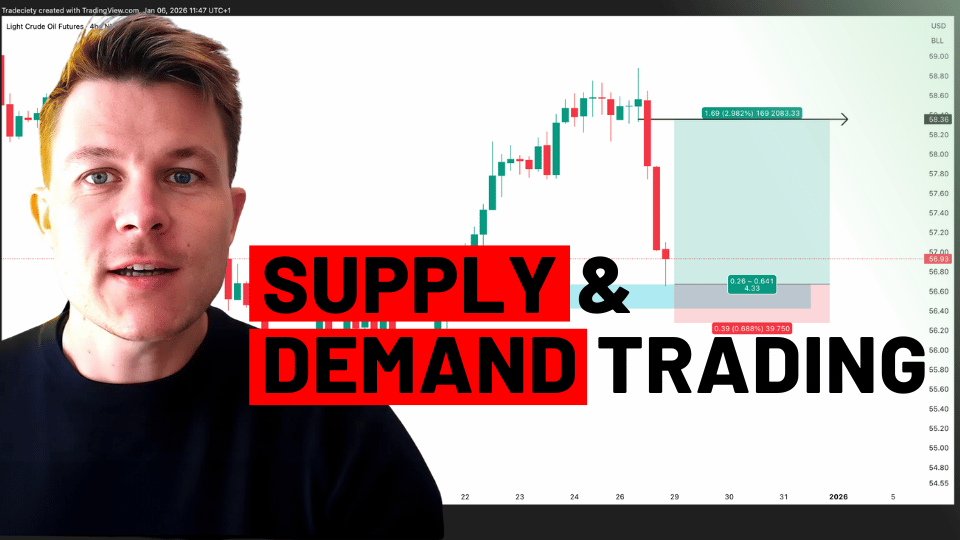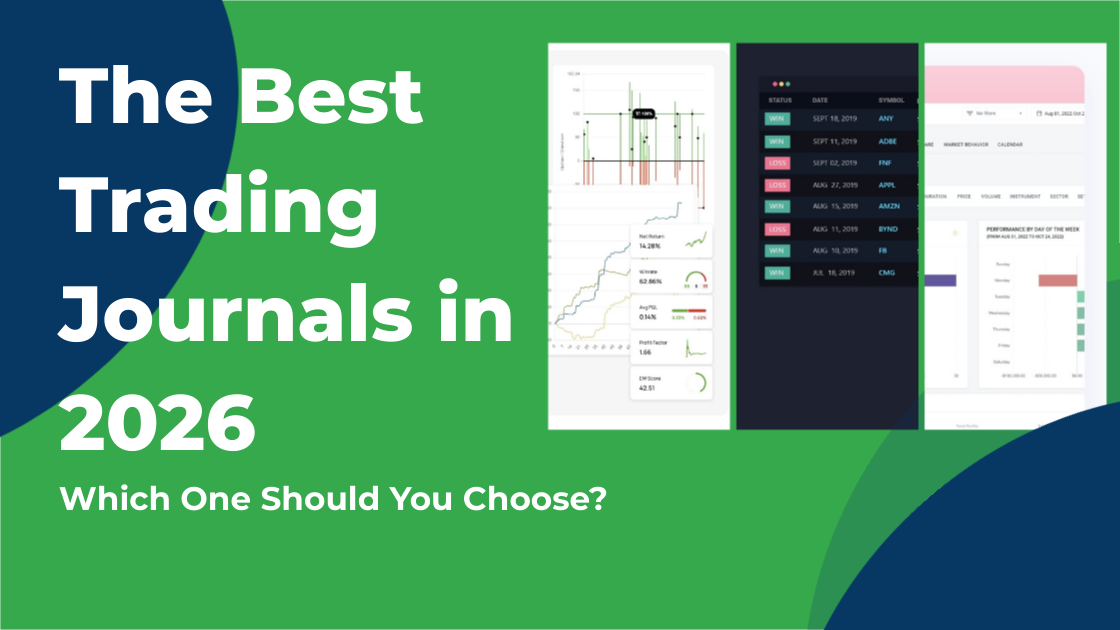Supply and Demand Trading in 2026
We have been trading supply and demand strategies for over ten years, and they have stood the test of time remarkably well. Supply and demand is...

In trading, there is a ton of things we can control but the most important thing we cannot control – the market, which is why we have to be in absolute control of everything else pretty much all the time. I know – especially for long-term readers of this blog – that some of these points may sound familiar to you but I also know that most of you simply don’t follow these guidelines ALTHOUGH they would push you so much closer to becoming a professional trader. Sad but true. The tips below you can easily start implementing today, RIGHT NOW, and you will immediately see an increase in your performance. That’s a promise. Excited? Well, well..
Yada, yada, yada. Just do it already. If I ever catch one of my students not using a trading journal, I will simply stop coaching them until they start using one, because frankly, I have better things to waste my time on. No trading journal, no money for you.
Set up your own or use a professional solution like Edgewonk which is easy to set up and will immediately grant you deep insights into your strategy and your own trading behavior. You will never, ever, ever make money without a trading journal. Just no.
Goes into the same direction like #1, same importance. If you don’t have a plan, then you don’t know what you are doing. If you don’t know what you are doing but you are still opening trades, make sure to stop trading by wiping your hard drive and burning your computer and QUIT wasting your and my time. Life has a lot more to offer than charts, believe me. If you don’t want to have a trade plan for whatever reasons, trading is just not for you. It doesn’t have to be elaborate, either.
A trade plan grows with you, step by step. Start simple, then add to it as you develop your style and strategy. In our professional trading classes, I am presenting my whole trade plan from A to Z, which is basically my blueprint to making money. You can take that trade plan as a template for creating your own and save a lot of time and hard work should you decide to join our pro community.
This one is down to the individual but from what I have seen over the past few years working with amateur traders, I can guarantee you that 99% of retail traders (that is YOU!) are risking way too big a portion of their account/net worth and are hugely overleveraged. The general rule which people can find on the internet is that they should never risk more than 3% or 2% of their account. I think that is way too much for beginners and for most experienced traders, as well.
The more you risk, the more emotionally involved you will be, the more your judgment will be clouded, and the higher your account volatility will be. Risking anywhere from 0.1% to 0.5% is a sensible approach and will make trading MUCH more fun for you as thinking clearly and making sound decisions without pressure and anxiety is indeed a lot of fun. I am convinced that a lot of people reading this would magically turn into profitable traders if they simply turned down their risk.
“Sleep is for broke people” – don’t’ believe that crap. “Not sleeping enough is for idiots” is what I say and you better believe that. How much sleep one needs differs from individual to individual. Generally, most people above 25 years of age need anywhere between 6 and 8 hours of sleep a night.
Find out what your sweet spot is and make sure to get that sleep. You will be happier, healthier, more focused, more objective, more everything. Sleep is awesome. Traders are decision makers. You are sleep-deprived, you make shit decisions, simple! Don’t believe me? As a daytrader, simply track how much hours you slept the night before in your trading journal and then compare performances, the pattern will present itself in a very obvious way.
If I don’t sleep enough, I become impatient and easily frustrated. That is NOT a good state of mind to be in. Also, if you have time, eat healthily and do some sports, but that is self-explaining, hopefully.
As retail traders, we are at a huge disadvantage, because we have to be our own coach. Ever seen a boxer that coaches himself? Or anyone, really, that is competing in anything on a world class level, have you ever seen any of those people not having a coach? Yes, me neither.
Now that is a problem, especially because most people lack objectivity when it comes to sizing up themselves. A good coach will always tell you the truth, your strengths, your weaknesses, and how to improve in certain areas. When we look at our abilities, we tend to see ourselves just as we see that “hot” person in the bar after 10 beers. Gorgeous!
And especially people that are attracted by trading seem to suffer from delusions of grandeur a lot, don’t ask me why. This industry simply attracts a lot of egos, probably because of all the money and the bling and the Wolf Of Wall Street coolness factor. I mean, have you ever been in a room with fellow “professional” traders? It’s a gigantic circle jerk, the masters of the universe congratulate each other on their awesomeness. Kind of reminds me of the regular manager meetings of the last corporation I was employed at. What a shit show.
So, if you don’t want to spend the money for a professional mentor or don’t want to spend the time to establish a personal connection with someone who might then help you out for free, what can you do? The answer is as simple as obvious, observe yourself! There are two easy tricks to do just that.
Firstly, record your screen while you trade and/or make your trading plans and set up your orders, this will establish a sense of someone looking over your shoulder. Secondly, also record your microphone and explain loudly to yourself what the hell you are doing at the moment, and why. Imagine explaining your thought process to your coach or to someone that wants to understand what you are doing right now. You will have to go into great detail about everything and this will really force you to think through your decisions. You will quickly notice that, actually, you have no clue about anything and that this would be hugely embarrassing in front of a real person/coach.
After recording, watch the video. Make notes about which topics you were insecure at and then dig deeper in exactly those areas until you know what’s going on and are able to explain your whole process of taking a trade like a professional.
The point is, your life will become much easier with a reliable and dedicated mentor, but we can still establish objectivity and a feedback loop by ourselves through the process I just mentioned and, of course, by using a trading journal, as well. If you want to trade for profits and not just for fun, you will need to take your game to the next level. World class level, that is.
Goes into the same direction as #5. We need accountability. A trade plan which we can stick to, a trading journal, and recording our trading behavior are all great when it comes to establishing accountability, but we need more. We need the sense of reporting to someone because only reporting to ourselves will get most people nowhere. Why did you do your homework? Because your teacher wanted to see them or your loving father would shell-shock you back to the stone age if you didn’t do them. You didn’t to them because you wanted to do them, but because someone else made you do them.
We need someone to report to and someone to explain to why we underperformed (or celebrate with if we overperformed!), period. That can be done in various ways. In our pro classes forum, people have trading journals where they post their trades every week and everyone can look at the trades and their thought processes, no matter how embarrassingly bad the trades were which they took. This establishes accountability and also a responsibility which is incredibly important because all too often it is too easy to find excuses and point fingers at anything else rather than ourselves when we fuck up.
Alternatively, you can find a peer group of traders or create a journal in a public forum. Or start a blog. Or you can publicize your performance on various platforms. Or talk to your girlfriend/wife, your parents, your friends, I don’t care. You need someone to talk things through with when things go bad or great. Tell them what you are doing, why you are doing it, what you want to achieve, and then report to them each week, tell them what went great and what didn’t. They will be honest with you, and this will help you immensely, trust me. You don’t want to disappoint them. Of course, you also don’t want to disappoint yourself, but not wanting to disappoint others, this is where the real pressure comes in, kicks your butt, and makes you work hard.
You can also donate 10% of your yearly winnings to charity, build schools in Nepal or feed kids in an underdeveloped region of the world. If you mess up, other people will suffer. This is what I do. Whatever works.
All too often I see people overly consumed by their calling. A bit of that is ok, we need that spark of obsession and madness to overcome never-ending adversity, especially in a field as competitive as trading. But when people start to think that their calling should be everyone else’s calling and that this particular thing is the most important thing in the world, things become dangerous (just remember your Mathematics or Music teachers in high school…preaching from the holy books of Axioms and Beethoven, acting like the donkey that only sees the carrot in front of it but nothing else – basically, radical idiots).
If you ever tried to accomplish something that was really, really hard for you to do (like playing one of Metallica’s guitar solos, for example), and then you went to bed, and the next morning suddenly it was much easier, then you know why I say “do something else”. We can only consciously access 10% of our brain’s capacity. It is always working in the background, solving problems, riddles, clearing up confusion, creating new connections and neural highways, and so on. This is why sometimes we can’t remember a name, then we forget about that task, but our brain keeps working on it, and 3 hours later suddenly that name pops up in front of our eyes.
Our brain needs time off to learn, to think on its own, to grow, to become smarter. Take time off trading each day, and a whole day off each week. This will ironically improve your performance, rather than diminish it.
Also, feed your brain with something else than trading. Read novels, have a hobby like writing music, and so on, something that feeds the creative side of your brain, or makes you think about something that you don’t understand yet, for example physics, or whatever. This will increase the overall strength of your brain and also benefit your trading. It’s the same as with the body: if you only train your biceps each and every day, you will look like a dork, and still get beat up by that 1.60 meters tall Bruce Lee copy, how embarrassing that must be.
The things I pointed out here are really incredibly easy to implement – and will surely give an instant boost to your bottom line. If you want to be the hunter and not the hunted, make sure to always watch your Reward:Risk ratio. Is there ANY risk to ANY of the above? NO. What is the potential reward? Well, because the risk is zero, the reward is basically infinite but let’s settle for 10:1 here. You don’t want to take a 10:1 bet? Then get out of here! You are in the wrong business.

We have been trading supply and demand strategies for over ten years, and they have stood the test of time remarkably well. Supply and demand is...

3 min read
Choosing the right trading journal is essential for traders wanting to analyze performance, refine strategies, and improve consistency. In this...

3 min read
“95% of all traders fail” is the most commonly used trading related statistic around the internet. But no research paper exists that proves this...